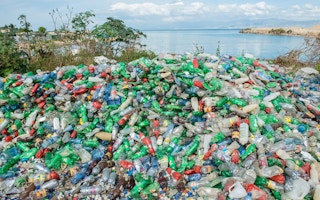An ambitious project from American computer manufacturer Dell to turn plastic debris bound for the ocean into products has secured an unlikely partner—rival computer firm HP.
To continue reading, subscribe to Eco‑Business.
There's something for everyone. We offer a range of subscription plans.
- Access our stories and receive our Insights Weekly newsletter with the free EB Member plan.
- Unlock unlimited access to our content and archive with EB Circle.
- Publish your content with EB Premium.
Dell, which claims to be world’s largest technology recycler, became the first company to use ocean-bound plastic in its products in a venture that started in 2016 in partnership with ocean life charity Lonely Whale Foundation.
The Texas-based company used plastic bottles sourced from refuse sites in Haiti to make packaging for its flagship XPS13 laptop. Dell has since scaled up the operation, called NextWave Plastics, to source debris from other coastal locations and involve other companies to create a global network of supply chains for ocean-bound plastic.
The venture has now added HP as a partner, along with global furniture retailer Ikea, with a mission to “keep plastics in the economy and out of the ocean.”
“
It’s become increasingly clear that the solution to marine plastic pollution requires bold innovation and open collaboration. No company can solve this issue alone.
Kevin Brown, chief supply chain officer, Dell Technologies
Ikea and HP join 10 other NextWave member companies, including furniture and homeware firms Herman Miller and Humanscale, carpet manufacturer Interface, and sunglasses and skateboard company Bureo.
The NextWave collective currently sources ocean-bound plastic from the Philippines, Indonesia, Chile, Cameroon and Denmark, and is aiming to add India, Taiwan and Thailand to its sourcing locations by 2025.
Collaboration within and between industries is critical to tackling a problem the scale of plastic pollution, commented Stuart Pann, chief supply chain officer for HP, which uses ocean-bound plastic to make ink cartridges.
Dune Ives, executive director of Lonely Whale and managing director of NextWave, commented: “Where others are planning for change, NextWave companies are making a difference today through the development of commercially viable and operational ocean-bound plastics supply chains and integration of this non-virgin material into products and packaging.”
NextWave aims to divert 25,000 tonnes of plastics—equivalent to 1.2 billion single-use plastic water bottles—from entering the ocean by the end of 2025. There is currently more than 86 million tonnes of plastic in the ocean, with an additional 12 million tonnes entering the ocean annually.








